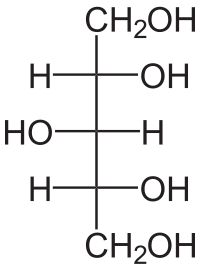
Photo from wikipedia
Inefficient transport of xylose into Saccharomyces cerevisiae is a major hurdle for production of xylitol, a natural sweetener with five carbons. To facilitate the xylose transport and hence increase xylose… Click to show full abstract
Inefficient transport of xylose into Saccharomyces cerevisiae is a major hurdle for production of xylitol, a natural sweetener with five carbons. To facilitate the xylose transport and hence increase xylose conversion to xylitol, the araE gene encoding an arabinose:H+ symporter (AraE) from Bacillus subtilis and the XYL1 gene from Scheffersomyces stipitis were expressed in Saccharomyces cerevisiae EBY.VW4000, a hxt null mutant. The resulting strain of EXHA exhibited 4.1 fold increases in xylose consumption rate and xylitol productivity, relative to the control strain without AraE. Also, overexpression of AraE in wild type S. cerevisiae D452-2 having all hexose transporters and the XYL1 gene increased both xylose consumption and xylitol production considerably. In a glucose-limited fed-batch culture with intermittent addition of xylose, the DXXA strain with multiple copies of araE and XYL1 produced 177.8g/L xylitol with 2.47g/L-h productivity, which were 26.9 and 17.6 times higher than those for a batch culture of the DX strain expressing the XYL1 gene only, respectively. It was concluded that B. subtilis AraE might be a potent xylose transporter and conferred much higher xylose-consuming and xylitol-producing abilities to S. cerevisiae.
Journal Title: Enzyme and microbial technology
Year Published: 2017
Link to full text (if available)
Share on Social Media: Sign Up to like & get
recommendations!